On December 11 and 13 of this year, seminars were held in the cities of Nukus and Urgench for representatives of textile enterprises under the TOT program, as well as in order to expand the export opportunities of the textile industry of Uzbekistan and increase competitiveness in the international market in these cities.
On December 11 and 13 of this year, seminars were held in the cities of Nukus and Urgench for representatives of textile enterprises under the TOT program, as well as in order to expand the export opportunities of the textile industry of Uzbekistan and increase competitiveness in the international market in these cities. The event is organized by the Gesamtmasche Association, the Chamber of Commerce and Industry of Uzbekistan (CCI) and the Uztextilprom Association.
The seminars focused on the effective use of GSP+ preferences and the strategic entry of Uzbek textile manufacturers into the European market. GSP+ preferences provide beneficiary countries with preferential access to the markets of the European Union (EU) by eliminating duties on thousands of types of goods, including textiles.
The seminars were attended by both local and international experts:
The participants of the seminars were explained the procedure for using tariff benefits for the export of textile products to EU countries. Special attention was paid to the criteria that Uzbek enterprises must meet in order to meet the requirements of GSP+, including commitments to sustainable development and respect for labor rights.
Patrick Martens presented strategies for the promotion of textile products on the European market to the participants. Practical recommendations were given on analyzing the needs of customers, forming competitive advantages and building an export strategy. The participants learned about the specifics of participating in international exhibitions and fairs, as well as about effective methods of working with European customers.
Mara Michele spoke about the importance of textile product design for a successful entry into the European market. The key trends in textile fashion and consumer requirements for the appearance of products were presented. Special attention was paid to the choice of color palettes, textures and innovative materials demanded by European buyers.
Experts focused on the need for textile enterprises to switch to more sustainable production methods. The participants were told about textile recycling methods, waste reduction and the use of environmentally friendly materials, which helps to increase the competitiveness of products in the EU market.
The seminars also became important steps for the production enterprises of the region in the development of the world market.
Following the results of the event, the organizers expressed their readiness to continue to support enterprises in terms of product certification, obtaining export advice and improving production standards.
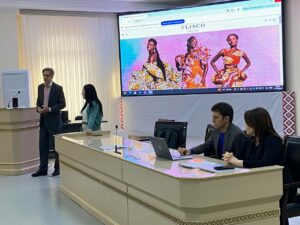
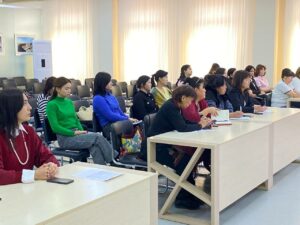
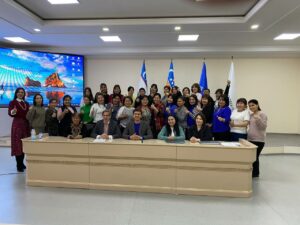
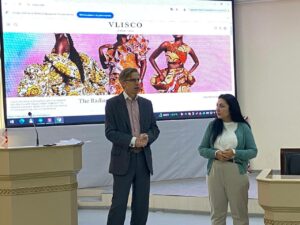
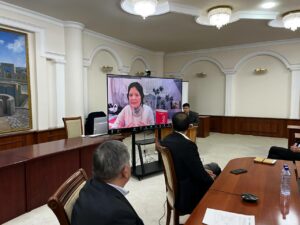
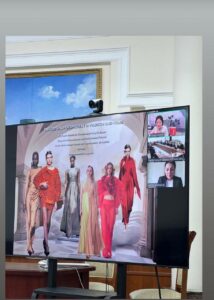
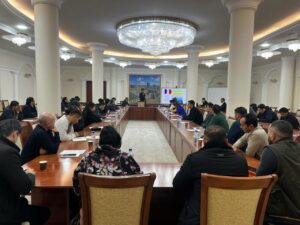
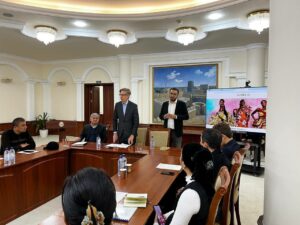
The second seminar was held in the beautiful city of Samarkand on the key factors for successfully entering the textile market of the European Union using the capabilities of the Generalized System of Preferences (GSP+). The event took place on December 4 of this year, in the conference hall of the Chamber of Commerce and Industry of the Samarkand region.
The seminar was organized by the German association Gesamtmasche, the Chamber of Commerce and Industry of Uzbekistan and the Uztextileprom Association in accordance with the TOT (trainers of trainers) program, the main goal of which is to identify export-oriented enterprises in the industry and promote them to European markets. After all, entering the European market represents enormous opportunities for Uzbek textile enterprises. However, to compete successfully, it is necessary to deeply understand the EU requirements for product quality, safety standards and environmental regulations. The GSP+ system provides preferential tariff preferences for Uzbek goods, which makes entry into the European market more accessible.
More than 30 entrepreneurs from the Samarkand region and nearby regions took part in the training seminar to obtain the necessary knowledge and skills to take advantage of these opportunities. The expert and trainer of the seminar was Bekzod Karazhanov, a participant in the TOT program who received valuable knowledge and was trained in Germany. He examined in detail the conditions and requirements of the GSP+ system of preferences, rules of origin of goods, certification procedures and customs clearance. He showed how to correctly fill out customs invoices and revealed customs advantages for goods from developing countries when imported into the EU. The trainer presented duty-free status under GSP+, documents for export and import, bill of lading and prices for air cargo transportation.
This seminar was highly appreciated by the participants, especially among women entrepreneurs.
They gained valuable information about opportunities to enter the European market, increased their awareness of EU requirements and strengthened their knowledge of export activities. Many participants expressed a desire to use the acquired knowledge in practice and actively develop their business in the international market.
The seminar, as a strategic step in supporting entrepreneurship and promoting the development of the textile industry of Uzbekistan, showed how effective the partnership of Gesamtmasche, the Chamber of Commerce and Industry and the Uztextileprom Association is in strengthening the country’s competitiveness in the global textile market.
The seminar on the TOT program: Effective use of the EU Generalized System of Preferences (GSP+) in Uzbekistan
In recent years, Uzbekistan has been actively developing its economic ties with the European Union, and one of the key tools for this is the Generalized System of Preferences (GSP+). In order to increase awareness and effectiveness of the use of GSP+, as well as within the framework of the TOT program, the last seminar of the series organized by GESAMTMASCHE e. V., GIZ Uzbekistan and the Chamber of Commerce and Industry (CCI) of Uzbekistan took place in Tashkent on December 17, 2024. It was attended by more than 50 companies of the textile sector offline and more than 20 companies via an online link.
The main purpose of the event was to provide participants with information about the opportunities provided by GSP+, as well as to discuss practical aspects of its application for Uzbek exporters. The seminar participants — representatives of business, government agencies and non—governmental organizations – had a unique opportunity to learn about the advantages of GSP+ and how to properly use this tool to increase export volumes. It was the final event that took place throughout the republic and involved more than 500 participants, entrepreneurs of the textile industry.
The seminar began with a welcome speech from the representative of the Chamber of Commerce and Industry Nodira Shotursunova, who is the deputy chairman. Then the participants were introduced to the basics of GSP+, a system that allows developing countries such as Uzbekistan to export goods to the EU on preferential terms, reducing or completely exempting duties.
During the seminar, experts shared practical recommendations on:
One of the key topics of discussion was the challenges faced by Uzbek companies when using GSP+. The participants noted the need to improve information support for business, as well as to increase the level of knowledge about international standards. The experts stressed the importance of creating effective communication mechanisms between government agencies and the private sector.
As examples of successful use of GSP+, cases of Uzbek companies that were able to increase their export volumes thanks to this system were presented. These stories inspired the participants to take active action and introduce new strategies into their work.
The seminar has become an important platform for the exchange of experiences and ideas among the participants. The organizers expressed the hope that the knowledge gained will help Uzbek exporters make the most of the GSP+ opportunities, contributing to the further development of the country’s economy and strengthening its position in the international arena.
In conclusion, the participants thanked the organizers for the event and expressed their desire to continue cooperation in the field of professional development and exchange of experience. It can also be noted that after each seminar, practical assistance and support in promoting the export of products is provided to representatives of companies, consulting work is carried out on German and EU requirements, on customs declarations, certifications, international system codes, nuances in export contracts, their document flow and other issues.